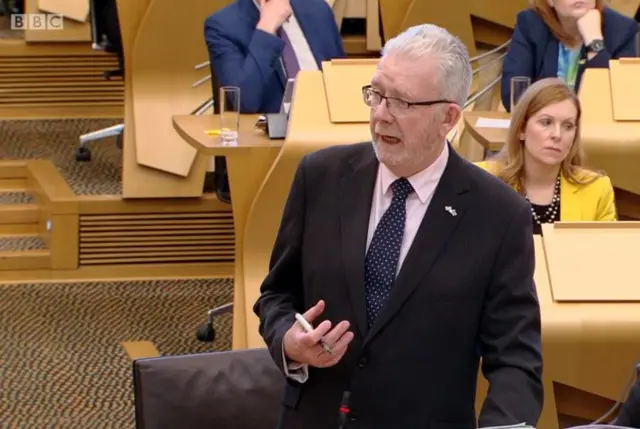Decision time: Healthy weight strategy motion and amendments unanimously agreed topublished at 17:09 Greenwich Mean Time 27 February 2018
 Image source, Scottish parliament
Image source, Scottish parliamentThe Economy Committee takes evidence from enterprise agencies on Scotland's economic performance
Topical questions sees the minimum pricing of alcohol raised and ScotRail’s cutting of carriages between Edinburgh and Glasgow
The Scottish government leads a debate on developing a Scottish healthy weight strategy
Brexit Minister Michael Russell gives a statement on the planned EU continuity bill
Scotch whisky's contribution to the Scottish tourism industry is debated by MSPs
Craig Hutchison and Louise Wilson
 Image source, Scottish parliament
Image source, Scottish parliament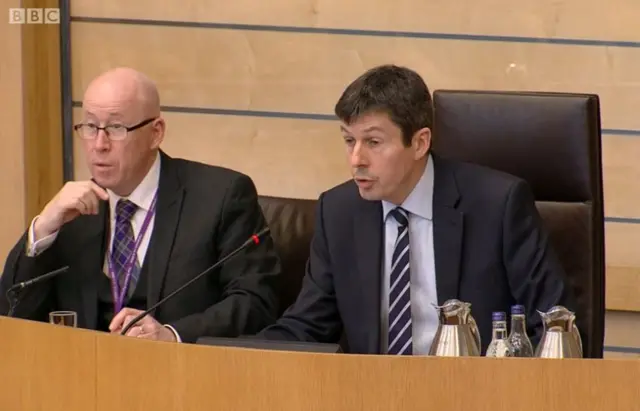
Lib Dem MSP Mike Rumbles raises a point of order on the timing of the bill and whether it is formally classified as an emergency bill.
Presiding Officer Ken Macintosh says the bill is not an emergency bill until the Scottish Parliament decides it is.
Any minister can propose it can be treated as such and a parliamentary bureau will meet this evening to discuss it.
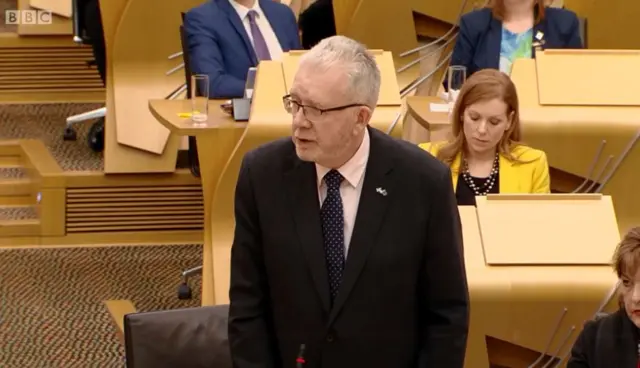 Image source, bbc
Image source, bbcMr Russell says there is no single market in the UK, rather a uniform market which allows different arrangements when required.
The Brexit minister points to minimum unit pricing is an example of this.
SNP MSP Alex Neil asks for a guarantee that if the UK government mounts a challenge to the legality of the continuity bill that the Scottish government will fight "it tooth and nail".
Mr Russell says that question would be for the Lord Advocate but adds "I can't imagine the position we have taken weakening in any way".
Labour MSP Daniel Johnson suggests setting up a formal cross-party body within which to hold discussions about the bill.
Michael Russell argues this would not be practical, but emphasises he hopes cross-party discussions will continue.
Technically, Westminster remains the sovereign government in the UK. It's written into the Scotland Act, which stresses that it "does not affect the power of the Parliament of the United Kingdom to make laws for Scotland".
It could in theory just run over the heads of the devolved administrations and have its way regardless.
The Supreme Court has underlined that legislative consent is a convention, rather than a legal matter that could be defended in the courts.
But the UK government swatting aside the wishes of Edinburgh and Cardiff would be a massive deal, politically. It would spark a constitutional crisis - indeed, Mr Russell contends that there isalreadya constitutional crisis.
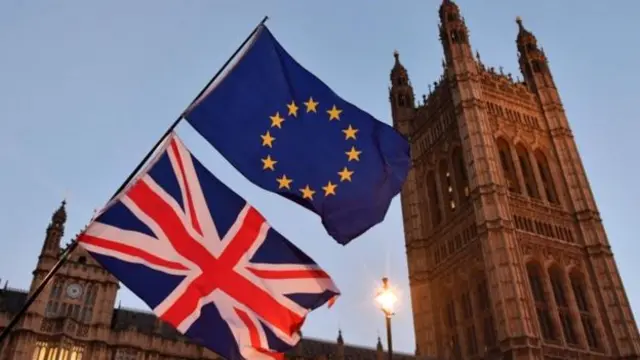 Image source, AFP
Image source, AFPThere is also the not insignificant matter of the House of Lords, which is currently scrutinising the Withdrawal Bill.
Several peers and indeed Conservative representatives north and south of the border have indicated that should devolved consent not be forthcoming, the Lords will not allow the bill to proceed.
This would add yet another layer of constitutional crisis. In the midst of the negotiations with European leaders, a domestic showdown is probably the very last thing Theresa May needs.
So by far the preferred outcome for the UK government is to strike a deal, one way or another, to get consent. But months of talks have so far failed to produce this - could a continuity bill prove the political lever to make the difference?
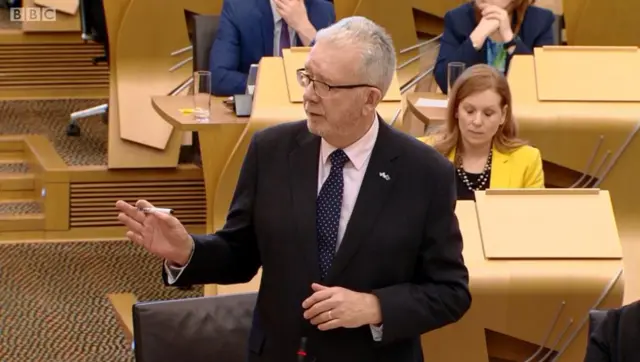 Image source, bbc
Image source, bbcMr Russell
Mr Russell says Boris Johnson's comment that the challenge of avoiding a hard border in Northern Ireland was like the boundaries between different boroughs of London as mind bogglingly stupid.
The foreign secretary said it was a "very relevant comparison" because money was "invisibly" taken from people travelling between Camden and Westminster when he was London mayor.
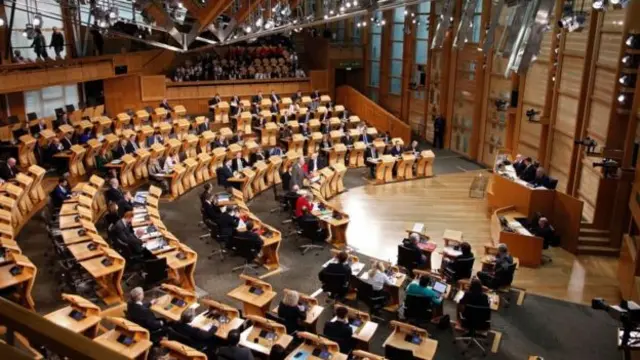 Image source, AFP
Image source, AFPWhat happens if MSPs don't give their consent to the Withdrawal Bill?
If Holyrood doesn't give its consent for the Withdrawal Bill, that doesn't derail the legislation - Westminster could just go ahead and pass it anyway, but without the contentious provisions applying to Scotland.
This would leave a gap in the law north in the border, which it would be Holyrood's job to fill.
The continuity bill would effectively be the Scottish Parliament's own version of the EU Withdrawal Bill, bringing EU laws across onto the domestic statute book ahead of Brexit.
After ministers "take back control" of these laws, they would then be free to amend or repeal them as they wish - crucially, at Holyrood rather than at Westminster.
This isn't necessarily a weird situation; Scotland already has a different legal system from the rest of the UK, and has increasingly been going its own way on policy with Holyrood's expanding powers.
Similar provisions were also included in the Scottish Independence Bill, external published in advance of the 2014 referendum, which would have brought UK laws onto the Scottish statute book so the newly independent Scottish Parliament could decide what to do with them.
However, some academics have warned, external that there cannot be a "simple division of powers" here, due to "the interplay of EU, UK and Scottish law", which are divided in "complex, unstraightforward ways".
Quote MessageWe cannot accept a diminuition of devolution and we will not accept a diminuition of devolution."
Mike Russell, Brexit Minister
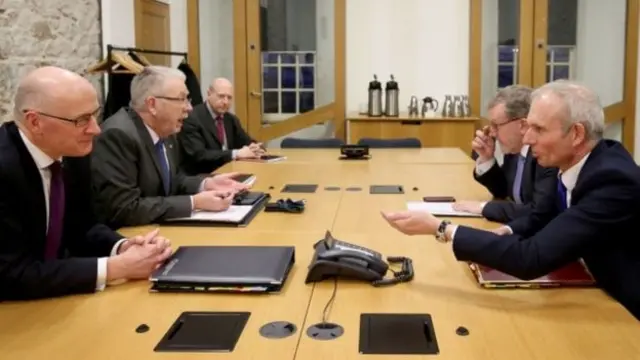 Image source, PA
Image source, PATalks between the two sides earlier this month ended without any deal being agreed
Perhaps the biggest piece of leverage Holyrood has in the Brexit process is the legislative consent process, where MSPs are asked to sign off Westminster bills which cut across devolved areas.
Scottish ministers say that until the row over powers is sorted out, they won't be putting forward any Brexit legislation for consent votes at Holyrood.
First and foremost, this concerns the EU Withdrawal Bill- the first big bit of Brexit legislation, and the one which contains various provisions about devolved powers.
First Minister Nicola Sturgeon now says its "very likely" her government won't put forward the Withdrawal Bill for a consent vote - meaning a continuity bill might well be needed.
Allow X content?
This article contains content provided by X. We ask for your permission before anything is loaded, as they may be using cookies and other technologies. You may want to read X’s cookie policy, external and privacy policy, external before accepting. To view this content choose ‘accept and continue’.
Allow X content?
This article contains content provided by X. We ask for your permission before anything is loaded, as they may be using cookies and other technologies. You may want to read X’s cookie policy, external and privacy policy, external before accepting. To view this content choose ‘accept and continue’.
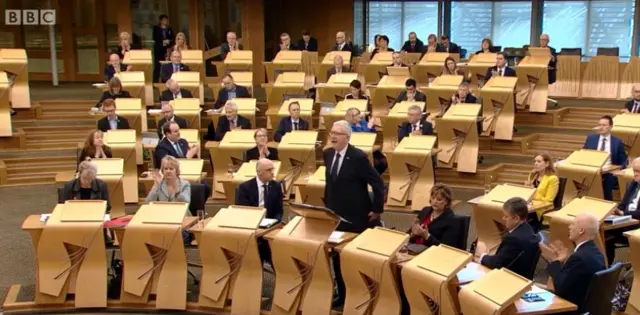 Image source, bbc
Image source, bbcMr Russell
Mr Russell says there is no question of the Scottish government agreeing to any diminuition of the Scottish Parliament's powers.
At present, there are a whole raft of powers which are technically devolved, but which are exercised from Brussels as they fall into EU-wide frameworks for issues like agriculture and fisheries.
When the UK leaves the EU, these powers will be coming back from Brussels - and the Holyrood and Westminster governments are at loggerheads over how this will happen.
First there was a row over where the powers would go in the first instance, before some are incorporated into UK-wide frameworks and others are just left with the devolved administrations.
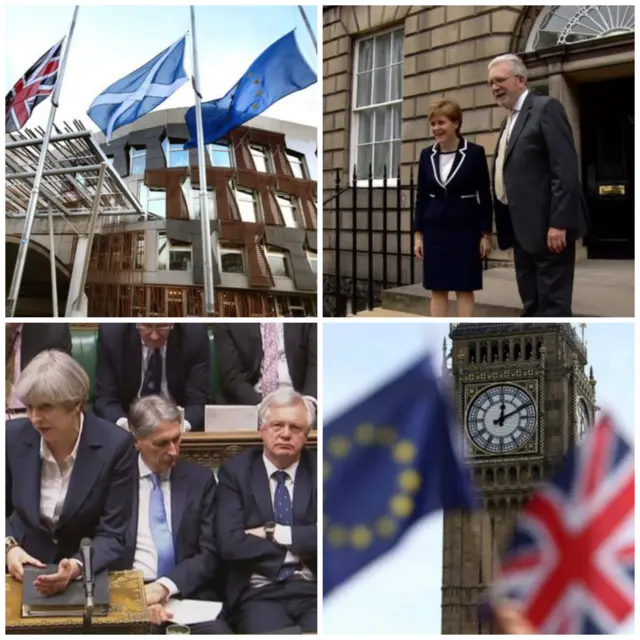 Image source, AFP/PA/Reuters/BBC
Image source, AFP/PA/Reuters/BBCThe latest offer from UK ministers is that "the presumption would now be that powers returning from the EU should sit at a devolved level".
Now, the dispute centres on how common frameworks are set up and administered. Scottish ministers aren't opposed to having these frameworks, but want them to be agreed mutually.
Cabinet Office minister David Lidington says that the UK government should be able to have the final say in some areas if they fail to strike a deal with the devolved administrations - so they can "protect the essential interests of businesses and consumers in every part of the kingdom".
Scottish Brexit minister Mike Russell says this is the UK government "using Brexit to try to take control of devolved powers without the agreement of the Scottish Parliament".
By BBC Scotland political reporter
 Philip Sim
Philip Sim
BBC Scotland political reporter
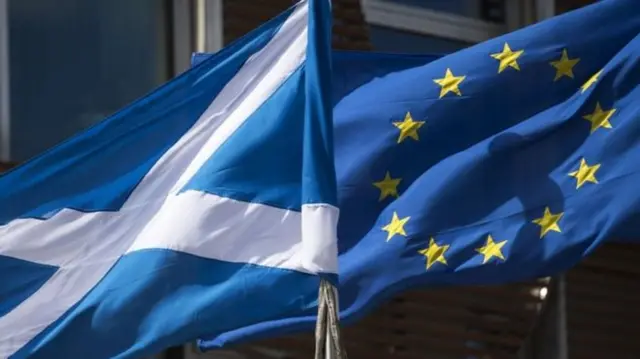 Image source, bbc
Image source, bbcScottish ministers have published a "continuity bill" as the latest feature of the ongoing row with the UK government over post-Brexit powers. What is the continuity bill, how would it work, and what might happen next?
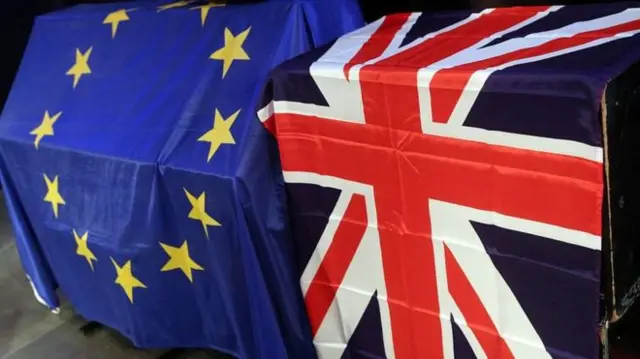 Image source, getty images
Image source, getty images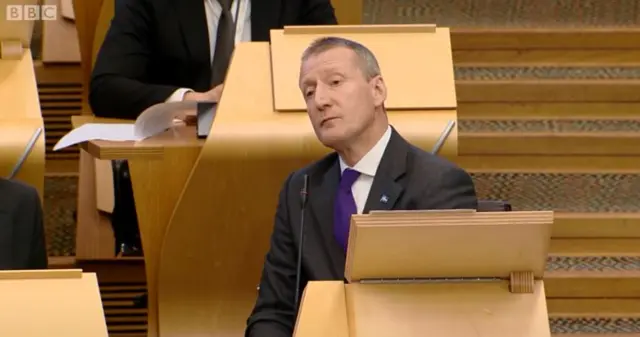 Image source, bbc
Image source, bbcLib Dem MSP Tavish Scott
Lib Dem MSP Tavish Scott says it is certainly unfortunate that the governments of the UK have not agreed, adding "this is not good".
Mr Scott says it is not satisfactory that there is not legal agreement on the continuity bill and he calls for further scrutiny after the Lord Advocate's statement tomorrow.
Mr Russell says the Lord Advocate will be open to question tomorrow.
He says the UK government is expected to publish an amendment to the EU Withdrawal Bill on or around 12 March, without consultation, which Mr Russell does not criticise.
Allow X content?
This article contains content provided by X. We ask for your permission before anything is loaded, as they may be using cookies and other technologies. You may want to read X’s cookie policy, external and privacy policy, external before accepting. To view this content choose ‘accept and continue’.
Allow X content?
This article contains content provided by X. We ask for your permission before anything is loaded, as they may be using cookies and other technologies. You may want to read X’s cookie policy, external and privacy policy, external before accepting. To view this content choose ‘accept and continue’.
Michael Russell commits to not withdrawing the continuity bill without the Scottish parliament's consent.
Reintroducing the charter of fundamental rights will be included in the bill, he adds, along with any other appropriate measures that will not cause delays.
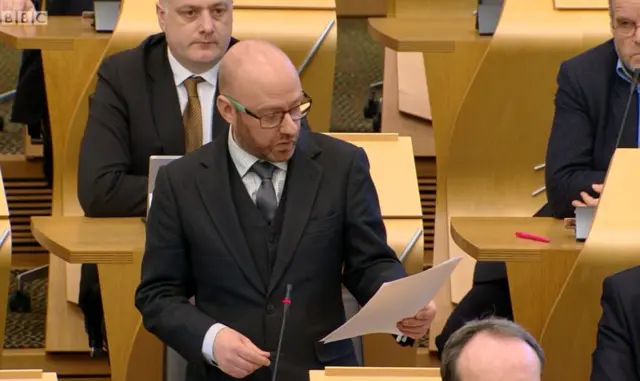 Image source, bbc
Image source, bbcScottish Green Party co-convener Patrick Harvie
Scottish Green Party co-convener Patrick Harvie says this continuity bill is absolutely necessary.
Mr Harvie says it falls to Holyrood to stand up to this power grab by the UK government.
He says he is pleased there will be more than the minimum level of legislative scrutiny.
The Green MSP says this should be about parliamentary control and not about Scottish government control.
He asks for a commitment that the continuity bill will not be withdrawn without the parliament's consent.
Mr Russell repeats the Lord Advocate will be available for questioning in the chamber tomorrow, which he hopes will allay some of Mr Findlay's concerns about the legal issues.
The bill now is a matter of timescale and there is "not a great deal of flexibility", hence the proposal that the entire chamber is engaged in its passage he says.
